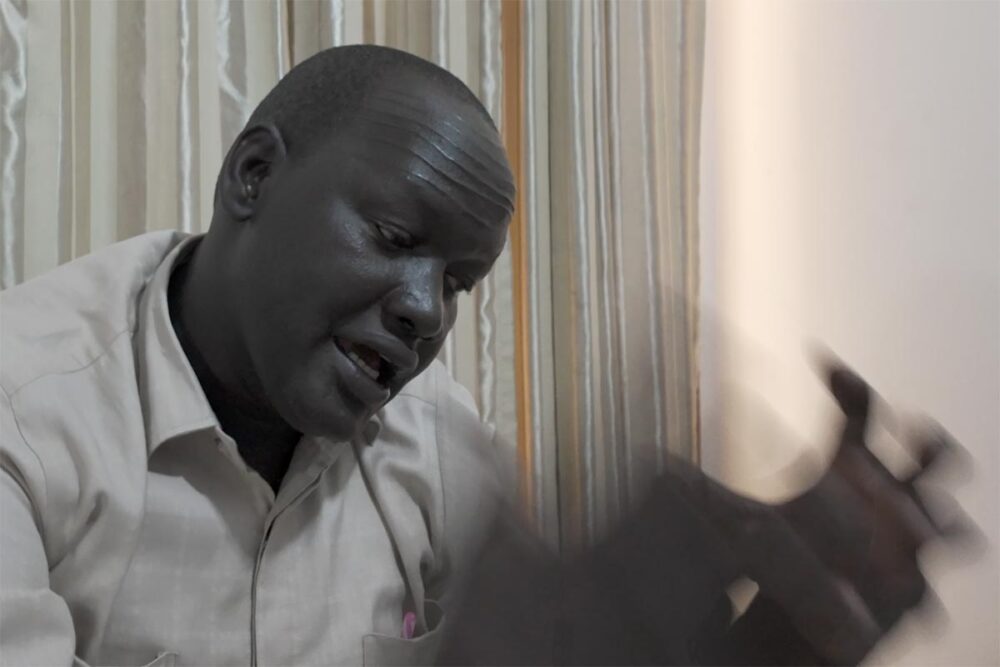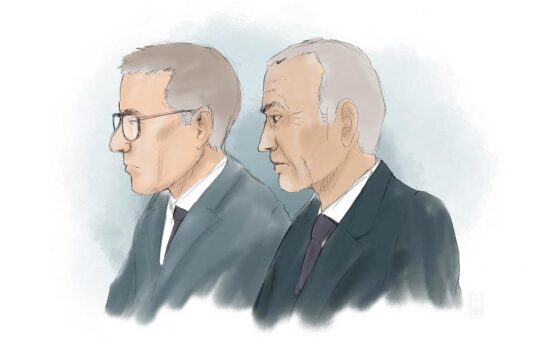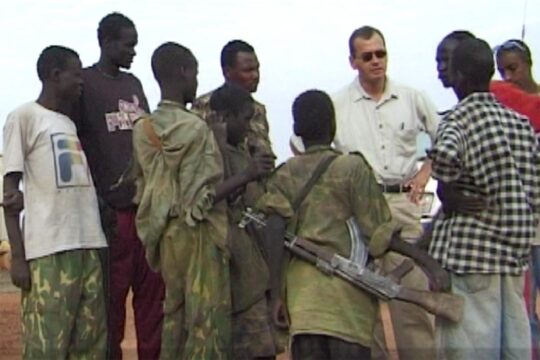Juba, December 2024. The air in the hotel room is heavy, curtains drawn against the blinding South Sudanese sun. A fan hums quietly on the ceiling, barely cutting the heat. George Tai sits on the edge of the bed, his phone in one hand, scrolling through old call logs.
“Here. Five minutes. Then again – three minutes. And this one, only two.”
He taps the screen, showing a list of numbers. The calls had come in rapid succession, just after he discovered someone had been inside his home.
A year earlier the human rights lawyer had returned from Sweden, where he gave interviews about the historic war crimes trial against former executives of Lundin Oil, a Swedish petroleum company. In court, he listened to defense lawyers arguing that violence in Unity State, north of South Sudan, where Lundin Oil started operations 25 years ago, was due to tribal conflict, not oil. But Tai disagrees: “They tried to make it all about our traditions, but I was there. This was about clearing land for drilling.”
Back in Juba he had no idea what awaited him in his own apartment. “I knew something was wrong the moment I put the key in the lock,” Tai says.
Inside, chaos. Clothes and papers strewn across the floor. A laptop shoved off the desk. Torn-up banknotes fluttering in the still air. Nothing had been taken but to him the message was unmistakable. Someone had been there. Someone wanted him to know. Later that evening, his phone rang. A man’s voice was on the other end, speaking Arabic with icy calm:
“George, we know what you said in Sweden. Lies about Lundin. Stop, or we will stop you.”
The calls didn’t stop. Neighbors reported two men loitering in the area, asking for him. Tai didn’t sleep that night. The following day, he fled.
“We will assassinate you one by one”
It all began in 2018. Tai was scrolling Facebook when he saw a post from a South Sudanese organization in Stockholm, announcing preparations for a lawsuit against an oil company – Lundin – that had operated in Block 5A. He was stunned. “I thought nobody still talked about this,” he recalls. He clicked “Like.” He left a comment. The next day, a Swedish investigator called. They agreed to meet. That’s when the messages started.
“We heard you’re talking to Europeans about crimes in Unity State,” one voice warned. “Stop spreading lies. If you don’t, you’ll pay with your life.”
Tai is not an isolated case. Throughout the Swedish investigation of Lundin, there have been persistent allegations that witnesses were bribed or threatened into silence. The Swedish police’s war crimes unit first launched an investigation into obstruction of justice in 2019, led by prosecutor Thomas Ahlstrand. It was closed in 2023 due to lack of conclusive links between the threats and the Lundin leadership. But now, as the main trial has entered its second year, Kalla Fakta, a Swedish investigative TV program, has presented new evidence. A prosecution witness, plaintiff Liah Diu Gatkuoth, said he received a WhatsApp voice message in September 2024: “This informs those who went to Sweden for the Lundin case. We have your names, and we will assassinate you one by one.”
The recording, sent from a South Sudanese number, went on to describe how airport security officials would be ordered to track and kill those involved in the trial. Kalla Fakta also interviewed a former Lundin employee who had been contacted by his old manager before the trial began. He was sent photos of two prosecution witnesses who had been interrogated by Swedish police. His task: locate them. Instead, he chose to warn them.
New allegations
The most serious cases of threats and violence were reported in 2017 and 2018. During that time, two British consultants worked for Lundin in South Sudan, attempting to find witnesses who could speak in the company’s favor and monitor those expected to testify against it, according to documents obtained by Kalla Fakta. One man interviewed by the TV program confirmed he worked closely with the consultants and the company's former security chief, who is suspected of being behind many of the threats and attacks. The man admitted to being shown photos of witnesses and tasked with locating them, including outside South Sudan. Another man told Kalla Fakta he was assigned to find witnesses so they could be killed: “If we kill them, there’s no case.”
When people refused to cooperate, violent methods were reportedly used. In one instance, a man who declined to testify was run over by a car in front of his brother. A second car then drove over him again.
One of the men pointed out by the plaintiffs confirmed he worked for Lundin in 2017-2018, trying to influence witnesses and assist in intelligence-gathering. He denied involvement in killings, claiming six witnesses died of natural causes.
Lundin and its former executives have consistently denied all accusations. “We take these allegations seriously but see them as completely unfounded,” said press officer of the company renamed Orron Energy in March, Robert Eriksson. The company also stated that it has not been formally informed of any new suspicions in the investigation on obstruction that was reopened in June 2024 by the Swedish Police. “It is incomprehensible that these baseless accusations continue to be used to discredit the company and its representatives,” wrote the spokesperson in an email on March 19.
In late March, these alleged threats were addressed directly in the courtroom in Stockholm. Egbert Wesselink from the Dutch peace organization PAX testified that already in 2016, he warned prosecutors about the risks to plaintiffs like Andrew Jagei, a radio operator who had received threats urging him to “switch sides.” Jagei initially chose to stay in Juba, where his family lived. But after his neighbor was killed, he feared he was the true target and fled. Wesselink said others also reported threats from individuals believed to be working on behalf of Lundin.
“More and more people came forward,” he said in court. “Even if we couldn’t assess the risk, we believed them. They were ready to leave their old lives behind.”
Bluff and easy asylum?
Petter Bolme, who helped prosecutors locate witnesses during the long investigation, also testified. He said threats were often received via text, voice messages, or accompanied by photos of injuries. When asked about witness credibility, Bolme acknowledged skepticism was necessary, but that the material often could be verified.
Lundin’s defense lawyer Per E. Samuelson raised doubts by pointing to a handwritten note by Jagei, allegedly offering to testify for Lundin in exchange for $50,000. “He later told us it was a bluff,” said Bolme. “He said he was told to write down what he wanted. He wanted the note back afterward.”
“Why would he lie?” asked Samuelson.
“I think he was playing a game,” Bolme replied. “But that didn’t affect how I gathered information. I always doubt, I always verify.”
Defense lawyers also emphasized that many witnesses were later relocated to Europe or the U.S. with the help of the UN High Commission for Refugees. Swedish police reportedly sent formal letters supporting emergency resettlement. “These letters made it easier for some to be accepted as refugees,” Bolme confirmed.
No one has yet been formally charged in the reopened obstruction investigation, but prosecutor Linda Wiking confirms it is now being treated as a serious case. “People have tried to influence or stop witnesses from testifying. That qualifies as gross obstruction of justice,” she said to Kalla Fakta. Authorities are also concerned for the safety of witnesses still in South Sudan. “We’ve already documented harm, and we don’t want anyone else to be hurt,” Wiking said.
For Tai, the new information only confirms what he already knew. He believes some former Lundin collaborators are now speaking out due to a guilty conscience. In Juba, reflecting on his visit to Sweden, he says: “I lost my job, my home, my country because of this trial. But I survived war as a child, and now I must speak out.”
Martin Schibbye is a Swedish Freelance journalist and founder of the news website Blankspot.se.







